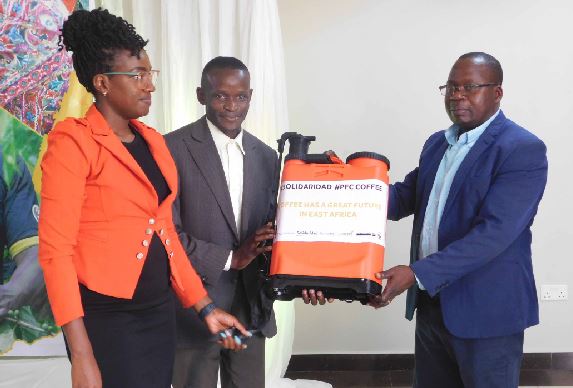Prime
Poor quality responsible for low coffee prices

Betty Musembi Slidaridad Programme Manager (left) and Robert Nangasa of UCDA (right) present a spray pump to model coffee farmer Joseph Lutaaya Bwanika (centre. Photo | Michael J Ssali
What you need to know:
- Uganda Coffee Development Authority are working closely with some universities to train coffee roasters and barristers in an effort to promote local coffee consumption.
According to Uganda Coffee Development Authority (UCDA), poor agronomy handling of coffee on both the farm and after harvesting, is the main reason the crop is fetching low returns. This was declared in Masaka City by UCDA chief field extension officer, Robert Nangasa, at the close out function of the Coffee Resilience Project (PFC) by Solidaridad, a Dutch funded international development organisation that has been giving support to coffee farmers in Uganda in the last five years.
Advice
He however, went on to say that until and unless the farmers pay enough attention to good production practices they cannot achieve high prices for the crop. He disclosed that private companies are hired by the government to remove foreign objects and bad coffee beans before the coffee is exported, which reduces the money that would have been earned by the farmers --- hence the low prices.
National Coffee Act 2021
He made reference to the recently passed National Coffee Act 2021 and said it was not really introduced to punish farmers but rather to guide them to follow the best production processes like drying coffee on tarpaulins and clean paved ground. This practice prevents bad smells and foreign objects like stones getting mixed with the coffee and spoiling its quality.
He said the law requires all coffee farmers to be registered because the government should know how many households in any given location are engaged in coffee production so that they can be supported in terms of inputs and allocation of extension staff. He also said the law is intended to ensure that farmers plant high yielding and disease resistant coffee varieties.
“This is why we are very strict about coffee nurseries sustaining high management standards. Good coffee farming begins with planting the right seedlings,” he said.
“The farmer is then expected to take the best care of the crop in the garden, to pick only the ripe cherries during harvest, and to dry the coffee on clean surfaces.”
Training barristers
He said that UCDA is now working closely with some universities to train coffee roasters and barristers in an effort to promote local coffee consumption.
He noted that while Uganda is Africa’s biggest coffee exporter Ethiopia is actually Africa’s biggest coffee producer. Unlike Ethiopia, Uganda consumes very little of its coffee which reduces local demand for coffee in Uganda.
Parish coffee advisers
In order to promote good coffee farming practices, Nangasa revealed that parish coffee advisers are going to be appointed in all coffee growing regions of the country to disseminate regular updates on coffee production and to display charts regarding clean handling of the crop.
Solidaridad, which is a not-for-profit international solution-oriented civil society organisation with centres in eight regions across the world, has been giving support to coffee farmers in Uganda aimed at increasing productivity and quality.
It has helped to open up coffee farmer groups and to train them in best coffee farming practices, environment preservation, and value addition. Molly Kwamah who sits in Nairobi and heads the East African Solidaridad regional office said that the organisation has only closed its five year support program for coffee production but it will continue to be active in Uganda supporting different other activities like leather, maize growing, tea growing, gold mining, fruits and vegetables production.
Farmer groups
In the last five years Solidaridad has set up strong coffee farmers’ groups such as Central Coffee Farmers Association (CECOFA) and Kyosiga Coffee Farmers Group that are now active in Kalungu District which is one of the coffee producing districts in Uganda.
A model coffee farmer, Joseph Lutaaya Bwanika who is also chairman of Kyosiga Coffee Farmers Group in Kalungu District praised the big contribution made by Solidaridad to their group which included regular farmers training, higher coffee production volumes, and bigger household incomes.
CECOFA Chairman, Musa Muwanga Ssalongo said Solidaridad’s intervention has greatly increased coffee production in Mubende and Kassanda districts and assured Solidaridad officials that the kindle that they had lit would continue to burn even after the organisation’s intervention of five years had come to pass. Model coffee farmers were presented with gifts by Solidaridad as a way of appreciating their contribution.




